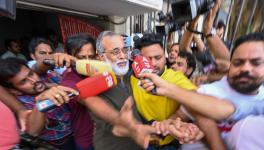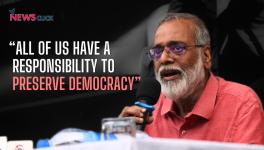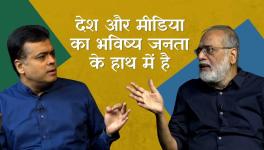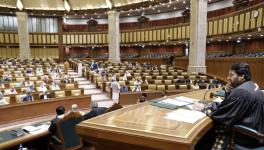India’s Rank Plunges Further to 159 in World Press Freedom Index-2024
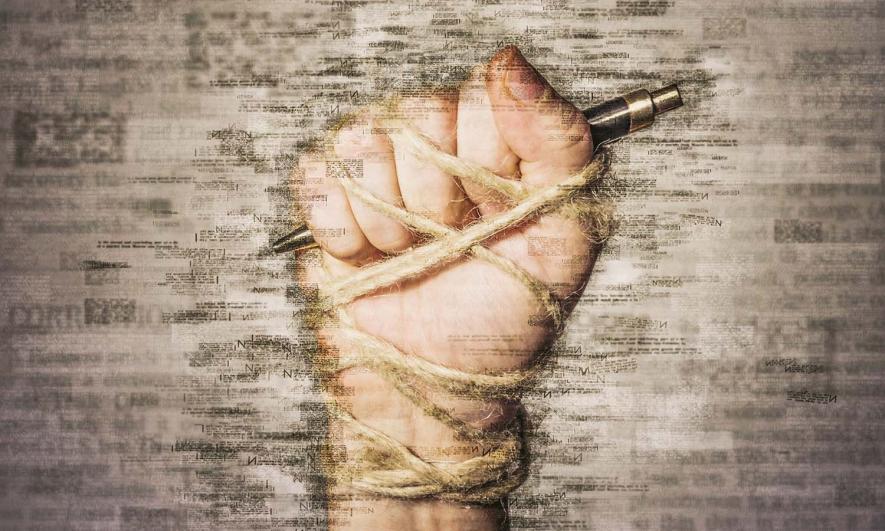
Image credit: IndiaSpend
New Delhi: In a stark commentary on the state of the media in the “world’s largest democracy”, India has dropped two notches to 159th position out of 180 countries in the World Freedom Index 2024, released by Reporters Without Borders or RSF. In 2023, India was ranked 161. The report comes amid general elections being held in the country.
“With violence against journalists, highly concentrated media ownership, and political alignment, press freedom is in crisis in “the world’s largest democracy”, ruled since 2014 by Prime Minister Narendra Modi, leader of the Bharatiya Janata Party (BJP) and embodiment of the Hindu nationalist right,” said the global report, released on World Press Freedom Day on May 3. The index ranks 180 countries on the ability of journalists to work and report freely and independently on the basis of five indicators -political, economic, social, legislative and security.
Commenting on the political context, the report notes that “India’s media has fallen into an “unofficial state of emergency” since Narendra Modi came to power in 2014 and engineered a spectacular rapprochement between his party, the BJP, and the big families dominating the media.”
It cites the takeover of the media by Modi’s “personal friends”, such as industrialist Mukesh Ambani “who owns more than 70 media outlets that are followed by at least 800 million Indians.” It also noted the acquisition of NDTV by Gautam Adani, “a tycoon who is also close to Modi”, signalling the end of pluralism in the mainstream media.
The report also noted the used of colonial era laws, such as on sedition and defamation, and anti-terror laws to supress the media. While mentioning how the main opposition party, Congress, and other regional parties had also used legal provisions of these laws to intimidate journalists, the report points out that the Modi regime had introduced “several new laws that will give the government extraordinary power to control the media, censor news and silence critics, including the 2023 Telecommunications Act, the 2023 draft Broadcasting Services (Regulation) Bill, and the 2023 Digital Personal Data Protection Act.”
Commenting on the lack of diversity in managerial positions and in the newsrooms in a plural country like India, the report points out the domination of Hindu upper caste men in the media landscape.
“The journalism profession, especially in managerial positions, remains the prerogative of Hindu men from upper castes – a bias that has repercussions on the angles and subjects of articles and reports. For example, on major evening talk shows, women represent less than 15% of the guests. Hindu nationalist ideology is experiencing a rise in power.”
It further notes that “most TV media outlets, particularly in Hindi, devote a significant portion of their airtime to religious news, sometimes openly advocating hatred of Muslims.”
On the safety aspect, the report found and average of three or four journalists are killed in India connection with their work every year.
“India is one of the world’s most dangerous countries for the media. Journalists who are critical of the government are routinely subjected to online harassment, intimidation, threats and physical attacks, as well as criminal prosecutions and arbitrary arrests,” it noted.
“Proponents of Hindutva, the ideology of the Hindu far right, call for popular revenge against critics branded as “traitors” and “anti-national”. Terrifying coordinated campaigns of hatred and calls for murder are conducted on social media, campaigns especially violent when they target women journalists, whose personal data is divulged,” it said while adding that the situation in Kashmirn was also “very worrisome” where reporters were often harassed by police and paramilitaries, with some being subjected to so-called “provisional” detention for several years.
Worrying, as Half the World Has Elections in 2024
Globally, the RSF report noted that attacks on press freedom were intensifying across countries, with independent media outlets and journalists facing growing repression.
The political indicator had fallen the most globally, by 7.6 points, which is worrying, it said.
“As more than half the world's population goes to the polls in 2024, RSF is warning of a worrying trend revealed by the 2024 World Press Freedom Index: a decline in the political indicator, one of five indicators detailed in the Index. States and other political forces are playing a decreasing role in protecting press freedom…” said Anne Bocandé, RSF editorial director. in the report.
The RSF report also flagged the increasing use of artificial intelligence or AI, calling its use in the “arsenal of disinformation for political purposes “disturbing”, with deepfakes being used to influence the course of elections”.
The report comes in a year when almost half the world will be going to the polls, and the media, especially independent ones, needs to play a crucial role in helping people take informed decisions.
Get the latest reports & analysis with people's perspective on Protests, movements & deep analytical videos, discussions of the current affairs in your Telegram app. Subscribe to NewsClick's Telegram channel & get Real-Time updates on stories, as they get published on our website.











